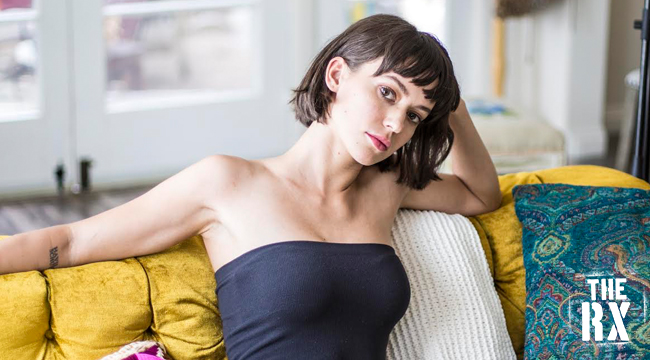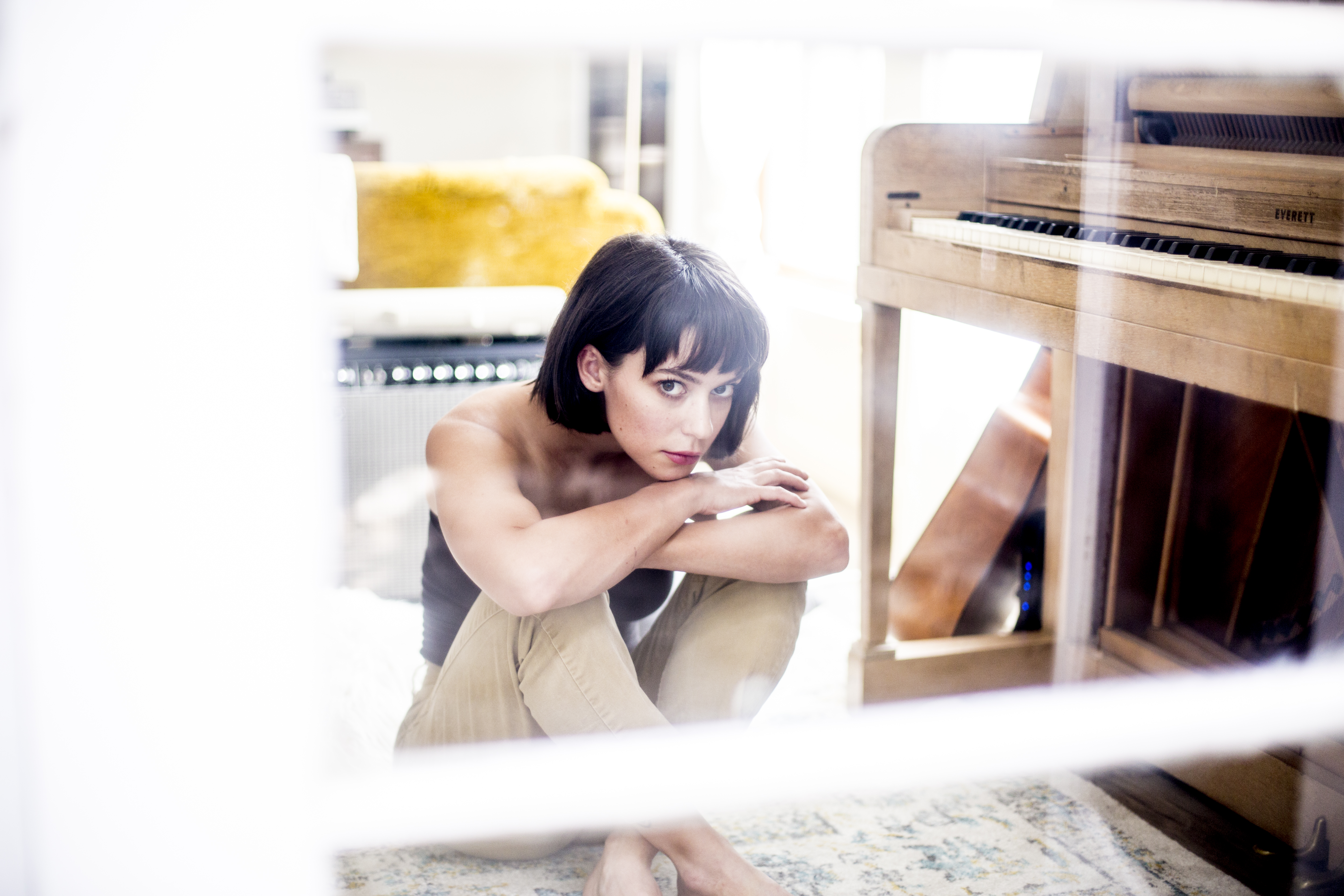
The RX is Uproxx Music’s stamp of approval for the best albums, songs, and music stories throughout the year. Inclusion in this category is the highest distinction we can bestow, and signals the most important music being released throughout the year. The RX is the music you need, right now.
Early in my meeting with rising alternative rocker Meg Myers at her quiet home in South Pasadena, I use the word “juxtaposition” in a description of her work. “I love that word,” she tells me excitedly, taking on a wide-eyed, highly-engaged energy that characterizes our time together.
“I just feel like that’s me in so many ways,” she continues. “Really extreme light and dark. I like incorporating extremes like that.”
On her sophomore album, Take Me To The Disco, Myers relishes in her ability to oscillate between influences, aesthetics, and even vocal deliveries. The album can sound like a throwback to ’90s alternative radio on the single “Numb,” can shake with intimacy and immediacy on the subdued title track, and explores electronic textures on “Little Black Death.” None of these temporary rabbit holes find Myers completely disappearing from view. She’s always there, peeking her head out, casting her distinct point of view at the center of all her explorations.
Raised in Tennessee in a strict religious household, Myers moved to Los Angeles at 20 to pursue her musical dreams. On her debut album, 2015’s Sorry, Myers quickly found success both on the airwaves (both “Sorry” and “Desire” cracked the top 20 on the alt charts) and for her kinetic live persona. But in the years since she parted ways with her label Atlantic Records in order to release this new collection that delves into the parts of herself she’d long kept out of the spotlight.
“In the past, I was so connected to pain and that was it,” she tells me between puffs of her American Spirit as we sit in her backyard during a particularly brutal Los Angeles heat wave. “But because of the work I’ve been doing, I’m connected to myself in a deeper way. I’m starting to understand some of the pain and transform it into beauty or creativity.”

Her newest effort is exactly that, beautiful and creative. It’s the work of an artist that has looked at herself in the mirror and dared to examine her past in the hopes of a healthy and happy future. It’s not so much self-absorbed as it is self-aware, as she has collaborated with producer Leggy Langdon on music that is less concerned with what other people expect her to sound like and more concerned with accurately representing herself. She puts her secret pretty frankly: “The deeper you are able to connect with yourself, the deeper you can connect to other people.”
I spoke with Myers about growing up as a Jehovah’s Witness, her powerful video for “Numb” that explores how women are treated in the workplace, and the healing power of music.
I love the sound of “Numb.” It really appeals to my love of ’90s alternative rock. Was that an influence on the song?
Yeah, it was. Especially for that song, that is one of the most ’90s songs on the album. Leggy and I were making playlists for each other for months while we were writing the album. There was a lot of ’80s and ’90s on there for sure.
That’s a good way to communicate, through playlists.
Yeah, it was amazing. And that way you’re not too inspired by just one thing or only listening to one thing. I was introduced to new music, but also just reminded of stuff. Most of the songs we knew, but it would be something I hadn’t heard since I was a teenager. That inspiring feeling, that goes straight back to being a teen, back when you first began discovering music for yourself and were diving into whatever it is that you would get into. It’s a really hard feeling to explain, but I get it sometimes when I run and hear a song that I love. It’s almost familiar.
I love hearing a song that you’ve forgotten existed, one that you’ve deeply loved. You can go five years or ten years without hearing it, and one listen will bring back all those old feelings.
You almost love it more. And since you’ve gone through whatever you’ve gone through in the time between, you hear new things in it. I think for some of the music I really loved, going through what I’ve gone through in the music industry, I’ve built a bigger connection.
Lyrically, “Numb” touches on that music industry experience. It’s not as nostalgic as the sonics of the song, since it deals with issues that are so current in 2018. And then the video really hammers that home with the microaggressions that women suffer in the workplace.
It’s a tough subject for me to talk about, because I never wanted to be a “man-hater” or something like that. And I don’t think that shaming people is necessarily the right way to help people grow. But I think talking about it and communicating the way things make you feel is a good way. It’s definitely been hard for me as a woman in the industry, and also just as a person on the planet. It’s been hard when you’ve been taught certain things your whole life and you grow up and find out it was all wrong. That all the belief systems that we’ve been taught are so whack.
That song was written about my label at the time, Atlantic. They’re a very radio single-driven label, and we were under pressure at the time. But that’s not me. The radio has certainly helped my career, but that’s not a focus for me. My focus is to create and then to give it to my fans. To experiment and speak from my heart, sonically or visually. So when I wrote that, I reached a point where I felt like the constant search for a radio single was ridiculous. And when I finished, I was like “we have it! We have a radio single, and it happens to be about them.” It wasn’t written as a woman against men, but more of what I was going through as a person.
But it took on a deeper meaning when I collaborated with Clara Aranovich on the video. She came up with the concept and I really related to it. Being a woman on the label… there’s a problem in alternative music where there aren’t many women on the radio right now. So, there were criticisms of my music that it doesn’t “sound like anything,” that it needed to sound like something already on the radio with less guitars maybe, and just an overall ‘”what is this” reaction. Well, it’s me. It’s me, Meg. I can’t really be put in a box. But I get it, it was just the wrong relationship. Atlantic allowed me to make the album, which was awesome, and then allowed me to keep the album. That video, though, we were able to speak for people that don’t think they have voices. And we were able to do it in a subtle way that was able to be related to by men and women alike.
In terms of the whole album, I was intrigued by the idea of writing about one thing, but then going back and listening and realizing you were writing about something more. When did that realization come about?
It was a few months after I wrote it and the songs brought me to tears. I had gone through a lot in those few months and I was able to step out of myself for a minute and listen to it as a fan would. It was really crazy because I realized that almost every song was a stream-of-consciousness. Writing it, I really thought it was about something. But listening, it was dead-on about something else, things I went through earlier in my life or in my childhood.
I had been doing a bit of therapy and had repressed memories coming up for me. And not just that, but things I did remember but had just pushed down. It was some dark, traumatic things that happened to me. Even as an adult, there are so many things we push down because you think ‘I just have to get through this,’ and you just cover it up. But I started to realize that a lot of things that happened to me, I hadn’t actually healed from. It was just energy stuck in my body that I hadn’t dealt with yet. I just pushed it down so I could keep getting through life. I’ve been in survival/protective mode almost my whole life, and it still comes out a lot, but I’m trying to live more and go back and deal with those things. The album was a way for me to deal with it without knowing.
Do you find making music cathartic, in general?
Very. I wouldn’t know how to do it any other way. It’s just therapy and expression, which can be hard sometimes because performing after the fact, going back and reliving it over and over, can also be pretty hard if you don’t want to keep going there.

You grew up a religious kid, right?
Yeah, Jehovah’s Witness. It was really strict and I was in it until I was 13. It’s wild. Religion brings people together and I’m for it if that’s what some people need. No judgment. But, for me, it was really hard. You don’t really grow up in the world. You grow up in a little bubble. The way that you are taught to look at the world as worldly and only we know the truth. And any day now Armageddon is going to come and everyone is going to die and if you’re not in that truth then you will die forever, but if you are in it you will be resurrected. It’s all these things that make up this really intense belief system.
Breaking out of it was extreme. At 13, it was drinking, smoking, sex, drugs, rock and roll. And then going back in forth to the extreme on the other end, with like no sex, nothing. If you were raised in an environment that strict, when you come out of it, you want to see what the opposite is. It took me until now to really work through that and get some of those ingrained beliefs out of my head.
The good thing is that I’m extremely spiritual and it’s made me want to dig deep into myself and figure out a lot more about life and people and what it all is. I think now, I believe that we’re all one, connected by an energy, and I’m just trying to work through it and not judge anyone else, because there’s a lot of judgment in religion. That lasted a long time up until now, so I’m really trying to break out of that and realize that any judgment is just a projection.
You eventually left your home in Tennessee and moved to Los Angeles to pursue music. It’s such a common story that’s it is almost cliche. How did the move exceed or subvert your expectations?
For me, it was really about learning what success is for each individual person. You have an idea when you’re younger, and that’s beautiful because that’s what gets you out there and actually doing it. I think I had an idea of what it looked like to be successful, with fame and money… I think coming from a really poor family and being religious, that motivated me to seek those things. But I’ve gotten to the place in my life where that’s not what drives me. What drives me is feeling connected, following things that make me feel good, creating, feeling stable and grounded, and having fun in life. That can be different for anybody. If someone says “I want to be a f*cking rock star or a superstar,” then awesome, but that’s not what drives me.
I had to discover that through coming out to LA. I came out when I was 20 and it was rough. I couch surfed for a long time, went through periods when I wasn’t doing music and somewhere I was. I had to figure out what I really wanted to do and how to say no to things. Like, what do I want to do? Rather than worry about what everyone else wants me to do.
Part of the arc of the album is breakup songs. That’s one of my favorite genres. Those kinds of songs, they make you feel like we’re all in this together. What do you think it is about breakups that makes it compelling for art?
I think because breakups, and love in general, that’s the place where we’re able to be most vulnerable, and also hide ourselves the most. It’s a really intense place to be, whether good or bad, maybe the most intense. And it’s such a universal expression because it is coming from such a vulnerable place. That’s so beautiful, because it shows how much we all want to be vulnerable and connect. That’s the main thing that we’re writing about.
It’s one of the only times in people’s lives that gives them the excuse to do what they really want. If you want to drink every day or stop exercising or eat whatever you want, or the other extreme where you want to get really into fitness or taking care of yourself — no one is going to question you. It could be self-destructive, but you are doing what you want.
Yeah, isn’t it funny? One of the things I’ve really learned in therapy over the last year is that people get confused about what it means to have self-love and what it means to work on yourself. And often people think that you can’t be in a relationship to do that, that you’ve got to be alone and do all the work on your own. But I don’t think that is true. I think that being in relationships is hard, especially if you are in a relationship with someone that triggers you. I’m in a relationship right now and I’ve never been triggered so bad. I’m looking in the mirror and it’s making me look at all these things about myself for the first time. I’ve been in other relationships that triggered me in the past, and it’s all led me to this. But I learned a lot from those, too. Being in relationships is really quite beautiful.
One of the things I’ve learned lately is if you are in an ungrounded place and having a hard time, the best thing to do is to soothe yourself. I think we’ve been taught that it is selfish to take care of ourselves, but when you’ve reached those places, the only option is to soothe yourself. You can’t help the world unless you are grounded and in a good place. I’m still wrapping my head around that one, thinking I’ve got to take care of all these other people. But really, you’ve got to take care of yourself. If you do that, everything around you magically gets better, and it gets better for the person that you are with.

The vocal performances on the album are really great because you do so many different things with your voice. When you think of your voice, where on the album do you think you sound most like yourself?
It’s all me, but I think when I go into my sort of “man voice,” which I do on “Tourniquet” and on “Some People.” I have these moments where I go to that, and it’s so me but I kept it from the world for a while because I felt insecure about it. I brought it back on this album but I haven’t done it since I was like 13, when I was in a band called Feeling Numb. I have this really low range that I go to and it’s loud. Nobody does it and because I’m a girl, that makes it even weirder. Leggy heard it and thought it was really cool, and he kept wanting me to go there. I ended up really embracing it and making a really comfortable place for myself.
The other place is when I sing really soft. It’s sort of like the extreme opposite of that, when I’m really soft and whispery.
A juxtaposition.
Exactly. I’m working on that, too. Sometimes I wonder if I need to get more to the middle because I’m so extreme with everything.
Take Me To The Disco is out now on 300 Entertainment. Buy it here.






